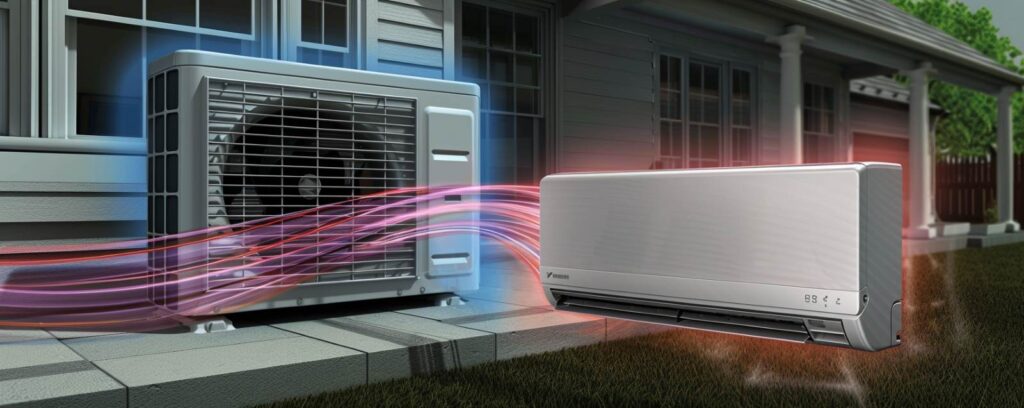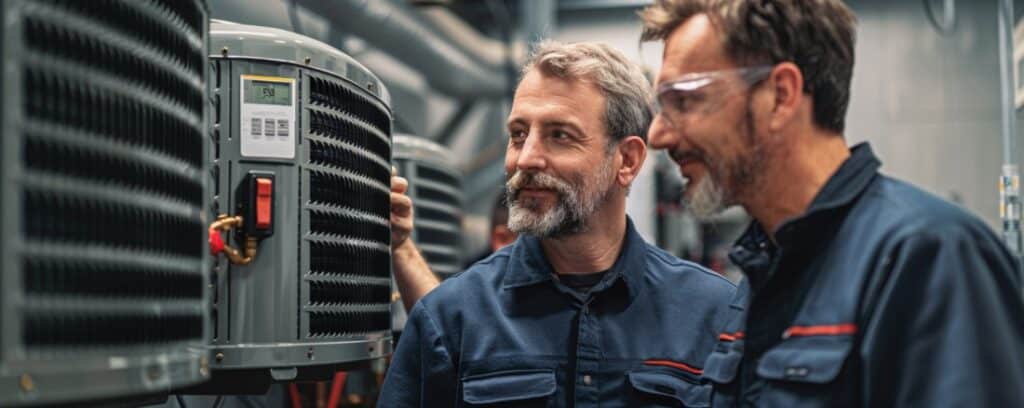- HVAC Technician Job Description
- HVAC Technician Pros: Benefits of the Career
- HVAC Technician Cons: Drawbacks of the Profession
- State of the HVAC Industry
- HVAC Technician Career Requirements
- FAQs on HVAC Careers
- What Is the Typical Career Path for an HVAC Technician?
- Are HVAC Jobs in Demand?
- How Do HVAC Technicians Keep Up with Technological Changes?
- Can HVAC Technicians Specialize in Certain Areas?
- What Is the Typical Salary Information for HVAC Technicians?
- What Is the Job Growth Projection for HVAC Technicians?
- Discover the Benefits of an HVAC Career
Heating, ventilation, and air conditioning (HVAC) systems are integral to maintaining comfort and health in homes, businesses, and industrial settings. As environmental considerations and technological advancements continue to evolve, the demand for skilled HVAC technicians grows.
These professionals play a crucial role in installing and maintaining HVAC systems, ensuring efficient and safe operation. This career, like any other, comes with its own set of advantages and challenges.
Understanding the pros and cons of working as an HVAC technician is vital for anyone considering this path. The article delves into various aspects of the profession, offering insights into the responsibilities, benefits, and potential drawbacks of an HVAC career.
HVAC Technician Job Description
An HVAC technician is a skilled professional who specializes in installing, maintaining, repairing, and replacing HVAC systems. These technicians work to ensure that heating, cooling, and ventilation systems function efficiently and effectively, providing comfortable and safe indoor environments for residential and commercial buildings.
Their role often involves diagnosing and troubleshooting system issues, conducting regular maintenance, and advising clients on system upgrades for energy efficiency.
HVAC technicians must stay abreast of technological advancements and regulatory changes in the industry to ensure optimal system performance and compliance.
HVAC technicians are technical experts whose skills are crucial in a variety of settings.
Their role is not only about maintaining comfortable temperatures but also ensuring air quality and energy efficiency, which are essential for health and sustainability.
What Does an HVAC Technician Do?
HVAC technicians specialize in the systems that control the climate within buildings. Their work typically involves the following tasks:
- Inspecting and maintaining HVAC systems to ensure they operate efficiently
- Installing new heating, cooling, and ventilation systems
- Diagnosing and repairing issues in existing systems
- Advising clients on energy efficiency and system upgrades
Key Responsibilities and Daily Tasks
The everyday tasks of an HVAC technician might include the following:
- Conducting routine maintenance checks
- Responding to emergency breakdowns
- Updating systems to comply with new regulations or technological advancements
- Collaborating with other construction professionals on large-scale projects
Variations in Roles Across Different Settings
HVAC technicians may find themselves working in diverse environments, such as the following:
- Residential areas: Focusing on home heating and cooling systems
- Commercial buildings: Managing larger systems that control the climate in offices, schools, or shopping centers
- Industrial settings: Working on specialized systems in factories or plants
HVAC Technician Pros: Benefits of the Career
Exploring the benefits of a career as an HVAC technician sheds light on the various positive aspects that attract individuals to this field.
From the potential for a stable and rewarding career path to the satisfaction of providing essential services, the pros of being an HVAC technician are diverse and impactful.
Let’s delve into these benefits to better understand what makes this profession an appealing choice for many.
1. Job Stability and Growth in the HVAC Industry
The HVAC industry offers a promising outlook for job stability, thanks to several key factors:
- The growing demand for climate control technologies keeps the need for skilled technicians high.
- The ongoing need to replace and upgrade older systems to meet modern standards ensures a steady flow of work.
- Regulatory changes are increasingly emphasizing the importance of energy-efficient systems, further bolstering the demand for HVAC expertise.
These combined factors contribute to a stable and thriving environment for professionals in the HVAC industry.
2. Earning Potential: Salary Overview
HVAC technicians enjoy competitive salaries, influenced by factors such as location, experience, and specialization.
According to the U.S. Bureau of Labor Statistics, the median annual wage for HVAC mechanics and installers was $51,390 in May 2022. The salary of HVAC professionals ranges from about $36,000 to about $83,000.
3. Skill Development and Career Advancement
Pursuing an HVAC career opens up a myriad of opportunities for professional growth:
- This path allows individuals to gain expertise in the latest climate control technologies, keeping them at the forefront of industry developments.
- The field has significant potential for career advancement, with pathways leading to supervisory or managerial roles.
- The field also offers the chance for technicians to specialize in niche areas such as refrigeration or solar energy systems, providing avenues for further expertise and career diversification.
4. Positive Impact on the Community
HVAC technicians play a vital role in the community, contributing in several meaningful ways:
- Their work ensures that living and working environments are safe and comfortable, a fundamental need in any community.
- They help in reducing energy consumption by maintaining and installing efficient systems, contributing to environmental sustainability.
- Their expertise in HVAC systems directly enhances air quality, a crucial factor for health and well-being, thus underscoring their importance in maintaining healthy communities.
HVAC Technician Cons: Drawbacks of the Profession
Prospective HVAC technicians need to have a balanced view of the advantages and challenges of an HVAC career.
They should have a realistic picture of what to expect in this dynamic and essential field, including the cons that come with the profession.
1. Physical Demands and Safety Concerns
Working as an HVAC technician can be physically demanding and can involve some safety concerns, with potential challenges such as:
- The job often requires frequent lifting, climbing, and working in confined spaces.
- Technicians are exposed to extreme temperatures and hazardous materials.
- Technicians face risks of injuries from handling heavy equipment.
2. Irregular Hours and Seasonal Variations
The HVAC profession often requires flexibility in scheduling, characterized by the following elements:
- The field includes seasonal spikes in demand, especially during summer and winter months.
- Emergency call-outs can lead to working outside normal business hours.
- The field includes the potential for irregular work hours during off-peak seasons.
3. Technical Challenges and Continuing Education
Staying abreast in the HVAC field requires a commitment to continuous learning, due to the following factors:
- Rapid advancements in HVAC technologies are taking place.
- The profession requires ongoing certification and training to maintain current skills and knowledge.
- HVAC professionals need to adapt to evolving regulations and environmental standards.
4. Environmental Factors and On-the-Job Stress
HVAC technicians may face stressors related to the following:
- They regularly work in different environmental conditions, from hot attics to cold basements.
- They must balance multiple job tasks under tight schedules.
- They may need to address complex system failures that require prompt resolution.
State of the HVAC Industry
The HVAC industry is experiencing the impacts of new technologies and regulations.
Prospective HVAC technicians should understand the landscape of the HVAC profession, emphasizing the dynamic nature of the industry and the requisite qualifications and skills.
Current Trends and Future Outlook
The HVAC industry is experiencing significant transformation due to:
- Technologica advancements like smart home systems and energy-efficient designs
- Increasing focus on sustainable and green technologies
- Growing global emphasis on indoor air quality, especially in the post-pandemic world
These trends indicate a robust future for the HVAC sector, with increasing demand for skilled technicians.
Impact of Environmental Regulations
Environmental regulations are reshaping the HVAC industry:
- Stricter energy efficiency standards leading to innovation in HVAC technologies
- Phasing out of certain refrigerants for environmental protection
- Increasing adoption of renewable energy sources in HVAC solutions
Such regulations are creating new opportunities and challenges for HVAC professionals, necessitating continuous adaptation and learning.
HVAC Technician Career Requirements
A blend of formal education, hands-on experience, and personal skills are critical for a successful career as an HVAC technician, providing the foundation for a rewarding professional journey.
Educational Pathways and Certifications
The path to becoming an HVAC technician typically includes the following steps:
- Completion of a vocational training program or apprenticeship in HVAC
- Obtaining essential certifications, like the EPA Section 608 certification for handling refrigerants
- State-specific licensure, which may require additional testing and experience
Essential Skills and Personal Qualities
Key skills and qualities for success in the HVAC field include the following:
- Technical proficiency in understanding HVAC systems and tools
- Problem-solving abilities to diagnose and repair system issues
- Customer service skills for effective communication with clients
- Adaptability to work in various environments and conditions
FAQs on HVAC Careers
What Is the Typical Career Path for an HVAC Technician?
An HVAC technician’s career path often starts with an apprenticeship or vocational training, followed by obtaining necessary licensures and certifications.
Career progression can include roles such as senior technician, supervisor, and eventually managerial positions. Some technicians may also opt to specialize in areas like refrigeration or green energy systems.
Are HVAC Jobs in Demand?
Yes, HVAC jobs are in high demand. Factors contributing to this demand include the ongoing need for climate control systems, an increasing focus on energy efficiency, and the regular need for system maintenance and upgrades.
How Do HVAC Technicians Keep Up with Technological Changes?
HVAC technicians stay current with technology through continuous education, attending workshops, and obtaining additional certifications in new technologies and systems.
Many also participate in professional organizations and forums to stay informed about industry advancements.
Can HVAC Technicians Specialize in Certain Areas?
Technicians can specialize in specific areas like commercial refrigeration, solar panel installation, or systems design.
Specialization typically requires additional training and certification in the chosen area.
What Is the Typical Salary Information for HVAC Technicians?
The salary for HVAC technicians can vary based on factors like location, experience, and specialization.
According to the BLS, the average annual salary for HVAC mechanics and installers was approximately $51,390 as of May 2022. The salary range in this field can vary widely, with top earners potentially making significantly more.
What Is the Job Growth Projection for HVAC Technicians?
The job outlook for HVAC technicians is positive, with the BLS projecting a 6% growth from 2022 to 2032 for HVAC mechanics and installers, faster than the average for all occupations.
This growth is partly due to the increasing demand for energy-efficient and environmentally friendly HVAC systems.
Discover the Benefits of an HVAC Career
Pursuing an HVAC career has its pros and cons. But while the profession has its challenges, including physical demands and the need for continuous learning, it also offers significant benefits such as competitive salaries, job security, and opportunities for advancement.
A career as an HVAC technician offers a blend of stability, growth potential, and the satisfaction of providing essential services.
For those interested in technology, problem-solving, and a career with a tangible impact on people’s comfort and environmental well-being, becoming an HVAC technician is a rewarding option to consider.
It’s a profession that not only challenges individuals but also offers the satisfaction of being part of an industry that’s crucial to modern living.
For more information on beginning a career in HVAC, explore our resources on education, certification, and career development opportunities in the HVAC field.




